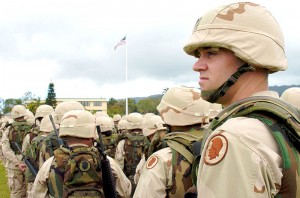 The skyrocketing number of traumatic brain injuries (TBI) due to the conflicts involving U.S. troops in Iraq and Afghanistan, while unfortunate, has revealed new connections that may eventually lead to better treatments. As the connection between TBI and Post Traumatic Stress Disorder (PTSD) becomes clearer, so does the understanding of the difference between the disorders.
The skyrocketing number of traumatic brain injuries (TBI) due to the conflicts involving U.S. troops in Iraq and Afghanistan, while unfortunate, has revealed new connections that may eventually lead to better treatments. As the connection between TBI and Post Traumatic Stress Disorder (PTSD) becomes clearer, so does the understanding of the difference between the disorders.
Causes of TBI is Civilian and Military Populations
The Department of Veterans Affairs has studied mild TBI (mTBI) in both civilian and military populations. The department found that approximately 80 percent of all TBI’s in civilians are mild. Most TBI is caused by falls, car accidents, a blow to the head, or assaults. Troops face different dangers, with the majority of mTBI coming from blasts.
Symptoms
However these injuries occur, they all have similar outcomes. Patients often experience:
- headaches
- dizziness
- sleeplessness
- memory problems
- intolerance to excessive noise and light.
While most patients return to normal functioning in three to six months, 10 to 15 percent will experience chronic post-concussive symptoms that may become permanent.
Permanent Injuries
Those who experience permanent injuries commonly experience ongoing headaches, ringing in the ears, difficulty sleeping, and cognitive disorders. They are also likely to suffer from PTSD, which can develop soon after the injury, or take months to develop. The injury does not have to be combat related for the distressing symptoms of flashbacks, nightmares, feelings of emotional numbness and hopelessness to plague the patient. Suffers are often anxious and depressed, leading to high rates of suicide among those not adequately treated.
Trauma and PTSD
PTSD is a reaction to situations where there is a threat of severe physical harm, making it more likely to occur in those injured from car accidents, other accidents that result in a blow to the head or a physical assault. This is why PTSD and TBI are such common companions among soldiers.
PTSD and Suicide
Estimates indicate that about one in five returning veterans have or will develop PTSD. The resulting stress, anxiety and depression have taken a great toll. In the early six months of 2009, the U.S. lost more soldiers to suicide than combat.
Recognizing PTSD
PTSD has become easier to spot as the defining symptoms of TBI become clearer. Patients with TBI who begin to feel anxious and depressed should ask their doctors about PTSD. Do not assume these feelings are the result of your injury. Certain medications and treatments that help PTSD may not otherwise be prescribed for TBI. Because of the danger of depression and suicide, families and loved ones should also be on the lookout for such symptoms when a brain injury has occurred.
Contact Us
TBI is a serious injury with life-altering consequences. If you or someone you love has experienced a traumatic brain injury, watch carefully for symptoms of PTSD and contact our office for a free consultation. We can examine the case and help the injured decide when it is appropriate to file a claim for compensation.


